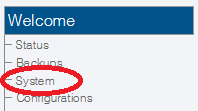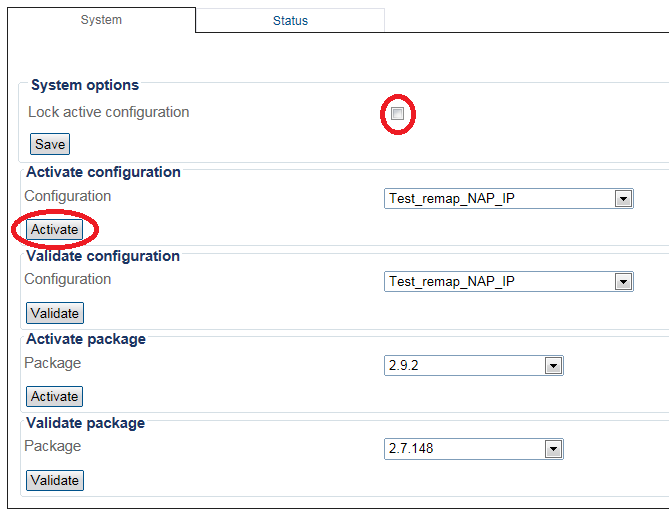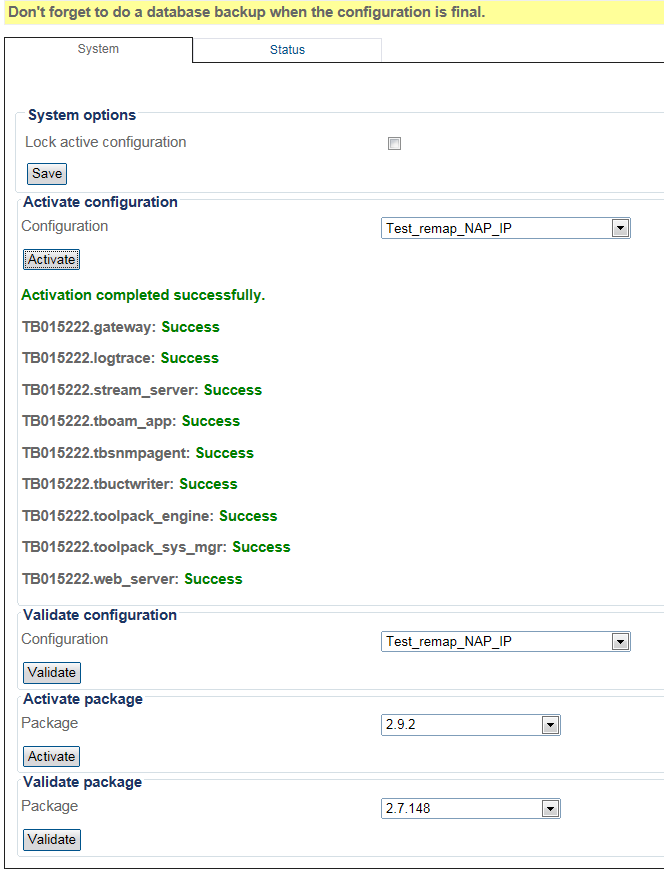Toolpack:Activating the Configuration D
m |
|||
| Line 1: | Line 1: | ||
=== '''''Applies to version(s): 2.9, 2.10, 3.0, 3.1, 3.2''''' === | === '''''Applies to version(s): 2.9, 2.10, 3.0, 3.1, 3.2''''' === | ||
| + | |||
| + | {| class="wikitable" | ||
| + | |- | ||
| + | |rowspan="2"|Applies to: | ||
| + | |'''Product''' | ||
| + | |'''Version''' | ||
| + | |- | ||
| + | |Tmedia | ||
| + | |2.9, 2.10, 3.0, 3.2 | ||
| + | |- | ||
| + | |SBC | ||
| + | |3.0, 3.1 | ||
| + | |} | ||
| + | |||
{{DISPLAYTITLE:Activating the Configuration}} | {{DISPLAYTITLE:Activating the Configuration}} | ||
Changes made to the configurations are stored in the OAM&P Configuration and Logging database. Any changes to the configuration must be activated, in order for them to be used by the system. This is done at the system level and accessed from the navigation panel. | Changes made to the configurations are stored in the OAM&P Configuration and Logging database. Any changes to the configuration must be activated, in order for them to be used by the system. This is done at the system level and accessed from the navigation panel. | ||
Revision as of 10:39, 6 November 2020
Applies to version(s): 2.9, 2.10, 3.0, 3.1, 3.2
| Applies to: | Product | Version |
| Tmedia | 2.9, 2.10, 3.0, 3.2 | |
| SBC | 3.0, 3.1 |
Changes made to the configurations are stored in the OAM&P Configuration and Logging database. Any changes to the configuration must be activated, in order for them to be used by the system. This is done at the system level and accessed from the navigation panel.
Note: To activate a configuration, you must be an Admin user or a user with write access to the System menu.
To activate a system configuration:
1. Select System from the navigation panel.
2. To activate the configuration, click Activate.
Note: Make certain that the Lock active configuration box is unchecked. Failure to do so will prevent the configuration from being saved.
3. Verify that an activation confirmation message is displayed. The system will remind you to back up your database when you are done configuring (at top of screen):
Path
/systems/@[system_name]
Parameters (text)
/systems/@[system_name] active_configuration = "@[configuration_name]" active_package = "@[package_name]" gw_port = @[port_number] lock_active_configuration = false migrate_database = true name = "@[system_name]" target_configuration = "" target_package = "" validate_configuration = "" validate_package = ""
Parameters (json)
{
"active_configuration" : "@[configuration_name]",
"active_package" : "@[package_name]",
"gw_port" : @[port_number],
"lock_active_configuration" : false,
"migrate_database" : true,
"name" : "system_1",
"target_configuration" : "",
"target_package" : "",
"validate_configuration" : "",
"validate_package" : "",
}


